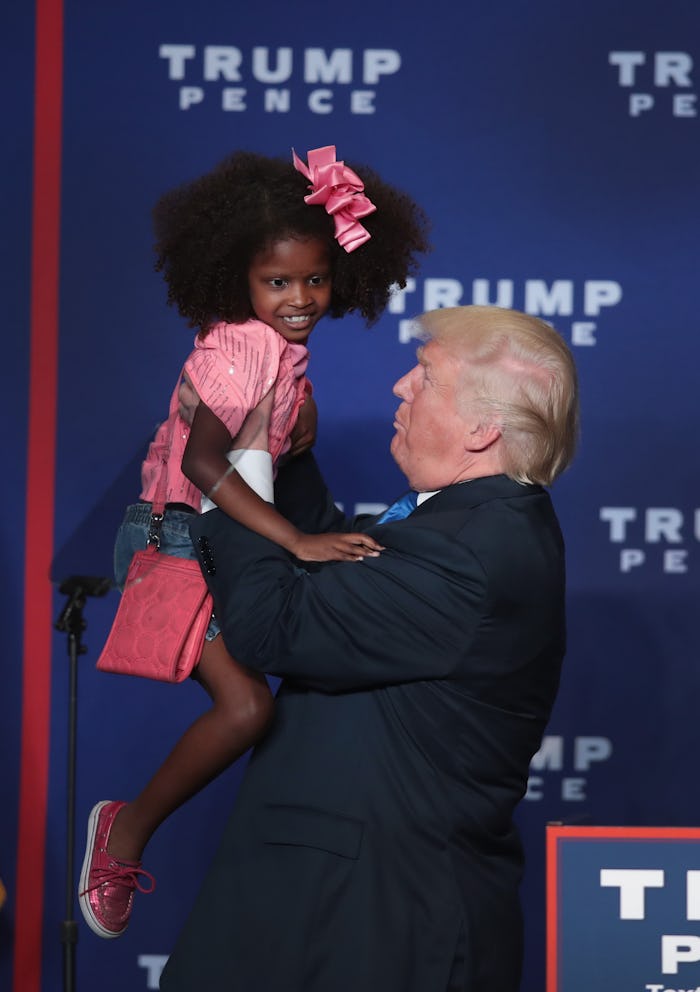Life

How Trump's Conspiracy Theories Affect Children, According To Experts
We need a new category for unsafe content: NSFC. Not safe for children. And we need to apply it to a lot of what one of the current presidential candidates has said. In the past, Donald Trump has cursed during a speech, bragged about sexual assault on tape, and implicated violence against opponents at a rally. NSFC, NSFC, NSFC. Now, he's touting conspiracy theories that blame the media and Hillary Clinton's campaign for sabotaging his campaign, according to the Washington Post. That's NSFC, too. As Dr. Laurie Berdahl told Romper, Trump's conspiracy theories can and do have lasting negative effects on children.
Berdahl is a retired physician who has published parenting research with her husband, a child psychologist. The two are also co-authors of Warning Signs: How to Protect Your Kids from Becoming Victims or Perpetrators of Violence and Aggression. Berdahl told Romper that Trump's conspiracy theories, which have sought to blame the media, the GOP and Democratic party members, and the government for his dwindling popularity, can have several negative consequences on children:
If you can convince people that they’re in danger from the media, the whole government, and minorities, that elicits a strong feeling of fear. Some people respond to fear aggressively; they might feel like they need to stand up and protect themselves from what seems like a global threat.
The Trump campaign did not immediately respond to Romper's request for comment.
Berdahl said that because of this perceived threat, children may feel threatened and could then behave aggressively. "We already have a problem with anxiety, bullying, aggression, and violence impacting our youth," she said. "So promoting aggression against our opponents the last thing our children need."
Conspiracy theories aren't the only way in which the GOP nominee has contributed to possible tendencies towards violence and aggression in children. His brand is hyper-masculinity, which has been well documented as a source of violence. As one New York Times' writer put it, Trump refuses to apologize, brags about never changing diapers, and bonds with other men by objectifying or degrading women. That's the definition of hyper-masculinity, and our boys are seeing it in a presidential candidate. When youth see Trump degrade women and his supporters defend him, they see bullying justified, Berdahl said.
And when they see Trump tweet mean things about former Miss Universe Alicia Machado or Sen. Ted Cruz's wife, they see cyberbullying tolerated. As the CEO of of ConnectSafely.org and founder of SafeKids.com wrote, Trump is a textbook example of cyberbullying, making him not only a bad role model, but also a contributor to the belief that cyberbullying is acceptable.
"Our kids have been seeing this kind of bullying from Trump throughout this entire campaign, and it's another method that helps further his conspiracy theories. It's a way to blame other people for his failures, and it's a big warning sign," Berdahl said.
But Trump's contribution to aggression in children doesn't stop at cyberbullying. He has defended and reportedly endorsed violence. “If you see somebody getting ready to throw a tomato, knock the crap out of them, would you?” Trump said at an Iowa rally before promising to pay the legal fees for the attacker. He also said in a Las Vegas rally, “I’d like to punch him in the face,” in reference to a protester, according to the Los Angeles Times. This is the kind of behavior that influences children, Berdahl said:
Youth is very important time period, in which children... learn how to handle emotions and how to think critically. When they see role models, whether it’s parents or political figures, exhibiting certain behaviors, it’s very influential on how they learn to behave and rationalize.
The aggression that Trump exhibits through his actions and most recently touted conspiracy theories definitely have an impact on our country's children. But there are several ways for parents to address the issues and make sure their children aren't being negatively impacted by the rhetoric.
Berdahl suggested teaching children the importance of and methods by which they can evaluate the validity of statements they hear that may sound exaggerated or aggressive. Talking to children about determining what's a good source and where to find the facts is a good approach. This helps children combat the manipulative nature of conspiracy theories, helps them learn to think for themselves, and decide what parts, if any, of a conspiracy theory might be valid.
Another important way to make sure children aren't being negatively impacted by the conspiracy theories that Trump and his campaign are spreading is by just talking to children if they've heard them. Berdahl does not recommend that children under 11 watch the news, but regardless of age, parents should be talking to their kids about the issues if the children have heard about it. Berdahl said:
As parents we have to, no matter what you believe, we have to say clearly to our children that aggression and violence is never a good way to solve problems. What we say as parents does matter. No matter what our kids get out of this election, the main things to teach our children are that violence and aggression are never ok.